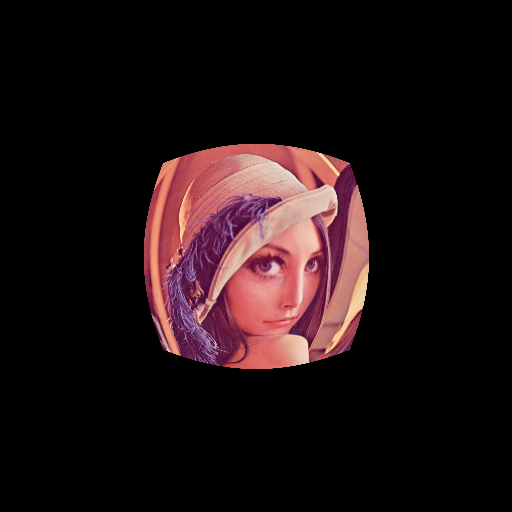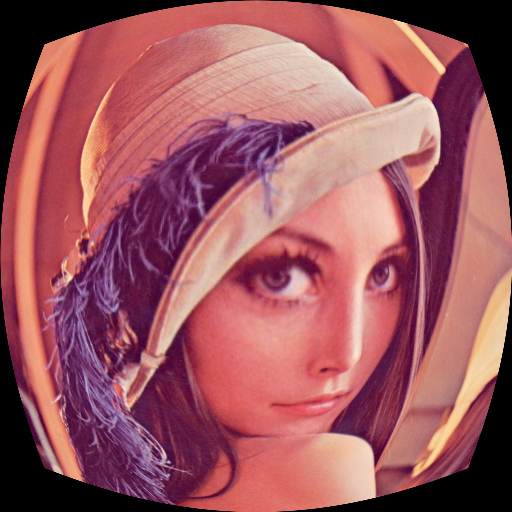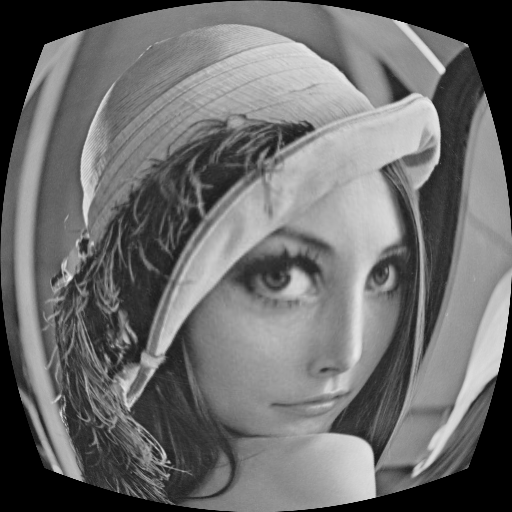This forum is disabled, please visit https://forum.opencv.org
 | 1 | initial version |
As I said since I found some time here is the port from the old C api to C++. In case also that someone will need it in the future:
#include <iostream>
#include <opencv2/opencv.hpp>
using namespace std;
using namespace cv;
float calc_shift(float x1,float x2,float cx,float k)
{
float thresh = 1;
float x3 = x1+(x2-x1)*0.5;
float res1 = x1+((x1-cx)*k*((x1-cx)*(x1-cx)));
float res3 = x3+((x3-cx)*k*((x3-cx)*(x3-cx)));
// std::cerr<<"x1: "<<x1<<" - "<<res1<<" x3: "<<x3<<" - "<<res3<<std::endl;
if(res1>-thresh and res1 < thresh)
return x1;
if(res3<0){
return calc_shift(x3,x2,cx,k);
}else{
return calc_shift(x1,x3,cx,k);
}
}
float getRadialX(float x,float y,float cx,float cy,float k, bool scale, Vec4f props)
{
float result;
if(scale)
{
float xshift = props[0];
float yshift = props[1];
float xscale = props[2];
float yscale = props[3];
x = (x*xscale+xshift);
y = (y*yscale+yshift);
result = x+((x-cx)*k*((x-cx)*(x-cx)+(y-cy)*(y-cy)));
}else{
// result = (cx+(x-cx)*(1+k*((x-cx)*(x-cx)+(y-cy)*(y-cy))));
// or
result = x+((x-cx)*k*((x-cx)*(x-cx)+(y-cy)*(y-cy)));
}
return result;
}
float getRadialY(float x,float y,float cx,float cy,float k, bool scale, Vec4f props)
{
float result;
if(scale)
{
float xshift = props[0];
float yshift = props[1];
float xscale = props[2];
float yscale = props[3];
x = (x*xscale+xshift);
y = (y*yscale+yshift);
result = y+((y-cy)*k*((x-cx)*(x-cx)+(y-cy)*(y-cy)));
}else{
// result = (cy+(y-cy)*(1+k*((x-cx)*(x-cx)+(y-cy)*(y-cy))));
// or
result = y+((y-cy)*k*((x-cx)*(x-cx)+(y-cy)*(y-cy)));
}
return result;
}
void fishEye(InputArray _src, OutputArray _dst, double Cx, double Cy, double k, bool scale = true)
{
// die if distortion parameters are not correct
CV_Assert(Cx >= 0 && Cy >= 0 && k >= 0);
Mat src = _src.getMat();
// die if sample image is not the correct type
CV_Assert(src.type() == CV_8UC1 || src.type() == CV_8UC3);
Mat mapx = Mat(src.size(), CV_32FC1);
Mat mapy = Mat(src.size(), CV_32FC1);
int w = src.cols;
int h = src.rows;
Vec4f props;
float xShift = calc_shift(0, Cx - 1, Cx, k);
props[0] = xShift;
float newCenterX = w - Cx;
float xShift2 = calc_shift(0, newCenterX - 1, newCenterX, k);
float yShift = calc_shift(0, Cy - 1, Cy, k);
props[1] = yShift;
float newCenterY = w - Cy;
float yShift2 = calc_shift(0, newCenterY - 1, newCenterY, k);
float xScale = (w - xShift - xShift2) / w;
props[2] = xScale;
float yScale = (h - yShift - yShift2) / h;
props[3] = yScale;
float* p = mapx.ptr<float>(0);
for (int y = 0; y < h; y++)
{
for (int x = 0; x < w; x++)
{
*p++ = getRadialX((float)x, (float)y, Cx, Cy, k, scale, props);
}
}
p = mapy.ptr<float>(0);
for (int y = 0; y < h; y++)
{
for (int x = 0; x < w; x++)
{
*p++ = getRadialY((float)x, (float)y, Cx, Cy, k, scale, props);
}
}
remap(src, _dst, mapx, mapy, CV_INTER_LINEAR, BORDER_CONSTANT);
// Mat(src).copyTo(_dst);
}
int main()
{
Mat input = imread("lena.jpg", CV_LOAD_IMAGE_GRAYSCALE);
if(!input.data || input.empty())
cout << "Problem loading image!!!" << endl;
imshow("input", input);
Mat output;
fishEye(input, output, input.cols / 2, input.rows / 2, 0.0001);
imshow("output", output);
waitKey(0);
return 0;
}




when again I find some more time I will try to add the pincushion distortion effect and an autocrop functionality.
 | 2 | No.2 Revision |
As I said since I found some time here is the port from the old C api to C++. In case also that someone will need it in the future:
#include <iostream>
#include <opencv2/opencv.hpp>
using namespace std;
using namespace cv;
float calc_shift(float x1,float x2,float cx,float k)
{
float thresh = 1;
float x3 = x1+(x2-x1)*0.5;
float res1 = x1+((x1-cx)*k*((x1-cx)*(x1-cx)));
float res3 = x3+((x3-cx)*k*((x3-cx)*(x3-cx)));
// std::cerr<<"x1: "<<x1<<" - "<<res1<<" x3: "<<x3<<" - "<<res3<<std::endl;
if(res1>-thresh and res1 < thresh)
return x1;
if(res3<0){
return calc_shift(x3,x2,cx,k);
}else{
return calc_shift(x1,x3,cx,k);
}
}
float getRadialX(float x,float y,float cx,float cy,float k, bool scale, Vec4f props)
{
float result;
if(scale)
{
float xshift = props[0];
float yshift = props[1];
float xscale = props[2];
float yscale = props[3];
x = (x*xscale+xshift);
y = (y*yscale+yshift);
result = x+((x-cx)*k*((x-cx)*(x-cx)+(y-cy)*(y-cy)));
}else{
// result = (cx+(x-cx)*(1+k*((x-cx)*(x-cx)+(y-cy)*(y-cy))));
// or
result = x+((x-cx)*k*((x-cx)*(x-cx)+(y-cy)*(y-cy)));
}
return result;
}
float getRadialY(float x,float y,float cx,float cy,float k, bool scale, Vec4f props)
{
float result;
if(scale)
{
float xshift = props[0];
float yshift = props[1];
float xscale = props[2];
float yscale = props[3];
x = (x*xscale+xshift);
y = (y*yscale+yshift);
result = y+((y-cy)*k*((x-cx)*(x-cx)+(y-cy)*(y-cy)));
}else{
// result = (cy+(y-cy)*(1+k*((x-cx)*(x-cx)+(y-cy)*(y-cy))));
// or
result = y+((y-cy)*k*((x-cx)*(x-cx)+(y-cy)*(y-cy)));
}
return result;
}
// Cx and Cy specify the coordinates from where the distorted image will have as initial point and
// k specifies the distortion factor
void fishEye(InputArray _src, OutputArray _dst, double Cx, double Cy, double k, bool scale = true)
{
// die if distortion parameters are not correct
CV_Assert(Cx >= 0 && Cy >= 0 && k >= 0);
Mat src = _src.getMat();
// die if sample image is not the correct type
CV_Assert(src.type() == CV_8UC1 || src.type() == CV_8UC3);
Mat mapx = Mat(src.size(), CV_32FC1);
Mat mapy = Mat(src.size(), CV_32FC1);
int w = src.cols;
int h = src.rows;
Vec4f props;
float xShift = calc_shift(0, Cx - 1, Cx, k);
props[0] = xShift;
float newCenterX = w - Cx;
float xShift2 = calc_shift(0, newCenterX - 1, newCenterX, k);
float yShift = calc_shift(0, Cy - 1, Cy, k);
props[1] = yShift;
float newCenterY = w - Cy;
float yShift2 = calc_shift(0, newCenterY - 1, newCenterY, k);
float xScale = (w - xShift - xShift2) / w;
props[2] = xScale;
float yScale = (h - yShift - yShift2) / h;
props[3] = yScale;
float* p = mapx.ptr<float>(0);
for (int y = 0; y < h; y++)
{
for (int x = 0; x < w; x++)
{
*p++ = getRadialX((float)x, (float)y, Cx, Cy, k, scale, props);
}
}
p = mapy.ptr<float>(0);
for (int y = 0; y < h; y++)
{
for (int x = 0; x < w; x++)
{
*p++ = getRadialY((float)x, (float)y, Cx, Cy, k, scale, props);
}
}
remap(src, _dst, mapx, mapy, CV_INTER_LINEAR, BORDER_CONSTANT);
// Mat(src).copyTo(_dst);
}
int main()
{
Mat input = imread("lena.jpg", CV_LOAD_IMAGE_GRAYSCALE);
if(!input.data || input.empty())
cout << "Problem loading image!!!" << endl;
imshow("input", input);
Mat output;
fishEye(input, output, input.cols / 2, input.rows / 2, 0.0001);
imshow("output", output);
waitKey(0);
return 0;
}




when again I find some more time I will try to add the pincushion distortion effect and an autocrop functionality.
 | 3 | No.3 Revision |
As I said since I found some time here is the port from the old C api to C++. In case also that someone will need it in the future:
#include <iostream>
#include <opencv2/opencv.hpp>
using namespace std;
using namespace cv;
float calc_shift(float x1,float x2,float cx,float k)
{
float thresh = 1;
float x3 = x1+(x2-x1)*0.5;
float res1 = x1+((x1-cx)*k*((x1-cx)*(x1-cx)));
float res3 = x3+((x3-cx)*k*((x3-cx)*(x3-cx)));
// std::cerr<<"x1: "<<x1<<" - "<<res1<<" x3: "<<x3<<" - "<<res3<<std::endl;
if(res1>-thresh and res1 < thresh)
return x1;
if(res3<0){
return calc_shift(x3,x2,cx,k);
}else{
return calc_shift(x1,x3,cx,k);
}
}
float getRadialX(float x,float y,float cx,float cy,float k, bool scale, Vec4f props)
{
float result;
if(scale)
{
float xshift = props[0];
float yshift = props[1];
float xscale = props[2];
float yscale = props[3];
x = (x*xscale+xshift);
y = (y*yscale+yshift);
result = x+((x-cx)*k*((x-cx)*(x-cx)+(y-cy)*(y-cy)));
}else{
// result = (cx+(x-cx)*(1+k*((x-cx)*(x-cx)+(y-cy)*(y-cy))));
// or
result = x+((x-cx)*k*((x-cx)*(x-cx)+(y-cy)*(y-cy)));
}
return result;
}
float getRadialY(float x,float y,float cx,float cy,float k, bool scale, Vec4f props)
{
float result;
if(scale)
{
float xshift = props[0];
float yshift = props[1];
float xscale = props[2];
float yscale = props[3];
x = (x*xscale+xshift);
y = (y*yscale+yshift);
result = y+((y-cy)*k*((x-cx)*(x-cx)+(y-cy)*(y-cy)));
}else{
// result = (cy+(y-cy)*(1+k*((x-cx)*(x-cx)+(y-cy)*(y-cy))));
// or
result = y+((y-cy)*k*((x-cx)*(x-cx)+(y-cy)*(y-cy)));
}
return result;
}
// Cx and Cy specify the coordinates from where the distorted image will have as initial point and
// k specifies the distortion factor
void fishEye(InputArray _src, OutputArray _dst, double Cx, double Cy, double k, bool scale = true)
{
// die if distortion parameters are not correct
CV_Assert(Cx >= 0 && Cy >= 0 && k >= 0);
Mat src = _src.getMat();
// die if sample image is not the correct type
CV_Assert(src.type() //CV_Assert(src.type() == CV_8UC1 || src.type() == CV_8UC3);
Mat mapx = Mat(src.size(), CV_32FC1);
Mat mapy = Mat(src.size(), CV_32FC1);
int w = src.cols;
int h = src.rows;
Vec4f props;
float xShift = calc_shift(0, Cx - 1, Cx, k);
props[0] = xShift;
float newCenterX = w - Cx;
float xShift2 = calc_shift(0, newCenterX - 1, newCenterX, k);
float yShift = calc_shift(0, Cy - 1, Cy, k);
props[1] = yShift;
float newCenterY = w - Cy;
float yShift2 = calc_shift(0, newCenterY - 1, newCenterY, k);
float xScale = (w - xShift - xShift2) / w;
props[2] = xScale;
float yScale = (h - yShift - yShift2) / h;
props[3] = yScale;
float* p = mapx.ptr<float>(0);
for (int y = 0; y < h; y++)
{
for (int x = 0; x < w; x++)
{
*p++ = getRadialX((float)x, (float)y, Cx, Cy, k, scale, props);
}
}
p = mapy.ptr<float>(0);
for (int y = 0; y < h; y++)
{
for (int x = 0; x < w; x++)
{
*p++ = getRadialY((float)x, (float)y, Cx, Cy, k, scale, props);
}
}
remap(src, _dst, mapx, mapy, CV_INTER_LINEAR, BORDER_CONSTANT);
// Mat(src).copyTo(_dst);
}
int main()
{
Mat input = imread("lena.jpg", CV_LOAD_IMAGE_GRAYSCALE);
if(!input.data || input.empty())
cout << "Problem loading image!!!" << endl;
imshow("input", input);
Mat output;
fishEye(input, output, input.cols / 2, input.rows / 2, 0.0001);
imshow("output", output);
waitKey(0);
return 0;
}




when again I find some more time I will try to add the pincushion distortion effect and an autocrop functionality.